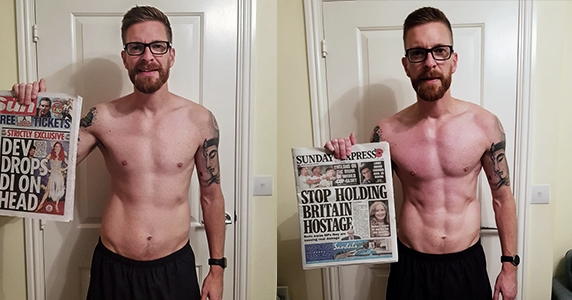Build muscle and lose fat with intermittent fasting
Learn more on the effect intermittent fasting has on your body and how it can help you lose fat and build muscle!

Intermittent fasting gained popularity over the last couple of years, for a good reason - from a medical standpoint, intermittent fasting has many benefits. However, the less known fact is that you can use intermittent fasting for both muscle gain and weight loss!
When hearing the word ‘’fasting’’ most people think of starvation, but that is not the right way to look at it. Intermittent fasting is an eating pattern that involves periods of food restriction (fasting). Your body will not starve, nor it will be deprived of nutrients (if you are eating nutritionally rich food in your eating window). Simply said, you will not eat in a certain time frame of the day or week. This is something our body is made for. In fact, English word ‘’breakfast’’ comes from ‘’breaking fast’’, and it does not mean to eat as soon as you wake up, but to break a fasting period. This is why breakfast is considered the most important meal of the day - not because you eat it in the morning, but because you use that meal to feed your body after the fasting period.
In the previous Madbarz blog, we have already covered the basics on what is intermittent fasting and how to practice it, so check it out before starting your regime. Make sure you should always consult a medical professional before starting such a regime, especially if you suffer from any medical condition. In this article, we will focus more on intermittent fasting for muscle gain and weight loss - to help you achieve summer body we all want!
While fasting, you consume fewer calories
Fasting means you will be skipping meals, whether it is just one meal or the whole day (or two) of eating. If you don’t compensate for skipped calories during the eating period, this means you will consume fewer calories. For example, if you skip breakfast or dinner, you can save 500 (or more) calories.
Healthline states that, on average, man needs to eat 2500 calories a day to maintain weight, and 2000 to lose one pound (approximately 0.5 kg) a week. An average woman needs to eat 2000 calories a day to maintain weight, and 1500 to lose one pound a week. Of course, these are average numbers and caloric need depends on a lot of things, but the point is - by skipping one meal on a day, without compensating later on a day, you will already be in a caloric deficit needed to achieve weight loss.
Fasting increases your metabolic rate
The metabolic rate stands for the number of calories you burn, so the higher the metabolic rate, the more calories you will burn. This means it will be easier for you to lose weight and to keep it off.
One study found that 2-day fast can increase resting metabolic rate for 3.6%, while another found an increase in metabolic rate for 11% after a 3-day fast. This means you will be burning more calories in your resting state than you did before, therefore increasing your total energy expenditure (and lose weight faster).
Often you will find information that prolonged fasting slows down your metabolism, and this is true. However, intermittent fasting is not the same as prolonged fasting, and it won’t bring your body to starvation mode. Therefore, it won’t slow down your metabolism if conducted the right way.
Fasting will burn fat, and preserve muscle mass
A lot of people are afraid they will lose muscle mass when they start with intermittent fasting. However, researches found no evidence for this claim. This can be explained in a simple way. When you are fasting, you are not consuming any calories. This forces your body to get the energy on other places - from fat stored in your body, not from your muscle. Some evidence even suggests intermittent fasting can be a better way of losing fat than continuous very low-calorie dieting.
This is not true only for obese or overweight people, but also for people who are in shape. One research looked at the effect of intermittent fasting on healthy resistance-trained males using popular 16:8 method of intermittent fasting. One group of participants conducted intermittent fasting and resistance training three times a week, while the other group followed a regular diet. Both groups gained the same amount of muscle, but a group that fasted lost more fat than the other group. So, intermittent fasting will not slow down muscle gain, nor it will make you lose muscle, or gain muscle at a slower pace, but it will make you lose fat.
Fasting activates human growth hormone needed for muscle building
Human growth hormone (HGH) is essential for both fat loss and muscle building. HGH deficiency in adults leads to a higher level of body fat and a lower level of muscle mass. If you are trying to lose fat and gain muscle, you will want to keep your levels of HGH high.
There is a lack of research on how intermittent fasting effects muscle gain, but there is clear evidence that shows it causes an HGH increase, as up as five-fold. The elevated HGH stimulated by fasting should increase muscle mass and make a recovery from a workout easier and faster.
This brings to the conclusion that, if you follow the right diet and exercise regime during intermittent fasting, you should achieve muscle growth, which brings us to the last point of the article.
Proper muscle building diet can be incorporated in intermittent fasting regime
Intermittent fasting alone will not cause muscle gain. However, accompanied by appropriate diet and exercise regime, muscle gain should be achieved. There are examples of athletes who achieved this. One of them is Madbarz athlete Kristijan, who shared his success story with Madbarz community. He conducted intermittent fasting combined with bodyweight training and achieved incredible muscle gain and fat loss.
Brad Pilon, author of the book ‘’Eat, stop, eat’’ is the proof you can achieve muscle gain and fat loss with intermittent fasting. Martin Berkhan, the ‘’father of intermittent fasting’’, consults professional athletes on how to conduct intermittent fasting and achieve muscle gain. Results of these athletes speak for themselves.
So, what is the secret? Basically, there isn’t one. To gain muscle, you need an exercise stimulus that will cause muscle growth. Secondly, you need to provide your body with enough resources to properly recover and create new muscle tissue. Simply said, you need to work out properly and eat properly.
Eat enough protein during your feeding window to ensure the building of new muscle tissue. Time your workouts in your feeding window, so you can eat post-workout muscle building food while you are in an anabolic state. Some researches concluded that resistance training, combined with intermittent fasting, helps preserve muscle mass while losing weight. So, Madbarz app and intermittent fasting make an excellent combination for muscle building and fat loss just before the Summer! ShapeScale explained in detail how to achieve muscle gain with intermittent fasting, we recommend you to check it out!
TAKEAWAY
Intermittent fasting is a great way to lose weight, and researches showed it won’t cause muscle loss. If you consume enough protein in your meals and exercise for muscle gain, intermittent fasting can help you lose weight and gain muscle at the same time.
It is important to combine intermittent fasting with sufficient work out regime. Madbarz Premium offers a wide range of workout plans focused on muscle building, while in-app Nutrition Guide contains 65+ healthy recipes that will help you feed your body with all the nutrients it needs for muscle building.




Post a comment